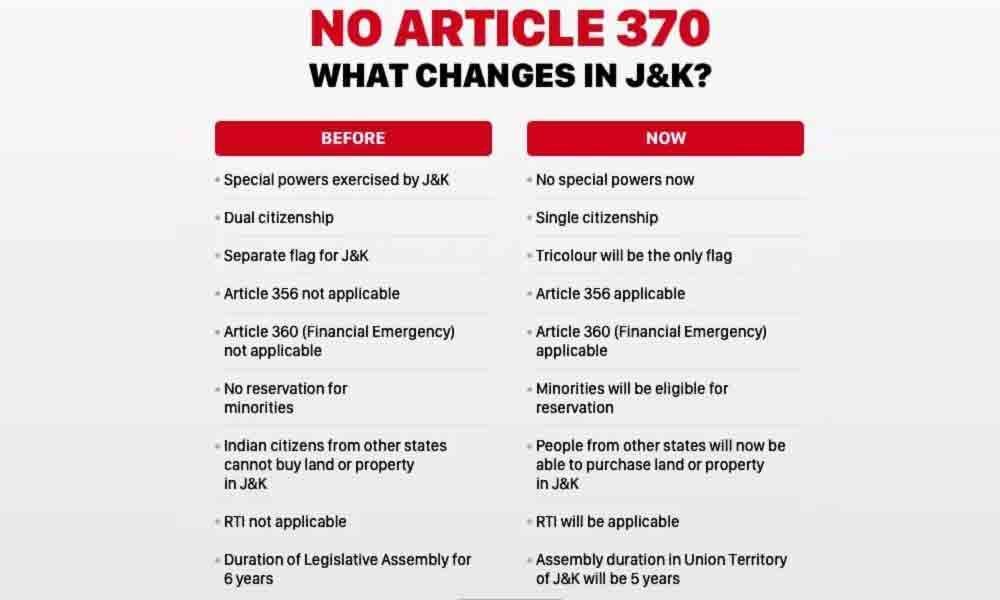Article 35A discriminated against women, Dalits: Govt

Schedule Castes Valmikis from Punjab, West Pakistan refugees, Gorkhas and women living in Jammu and Kashmir for the past six decades were suffering as they were not treated as residents of the state, the government said on Monday while explaining why Article 35A (that defined permanent residents of J&K) had to go.
New Delhi (IANS): Schedule Castes Valmikis from Punjab, West Pakistan refugees, Gorkhas and women living in Jammu and Kashmir for the past six decades were suffering as they were not treated as residents of the state, the government said on Monday while explaining why Article 35A (that defined permanent residents of J&K) had to go.
In a booklet issued on the scrapping of special status to Jammu and Kashmir, the government said that the Valmikis (Dalits) living in the state since 1957 were compelled to become sweepers in the Muncipality of Jammu and were not given permanent residence certificate (PRC).
The note said the youth of the community may be qualified as lawyers, doctors and teachers but were only eligible for the post of sweeper in the absence of PRC. The women, too, could not choose their life partner outside the state, said the government, making the Article unconstitutional, discriminatory and biased.
Explaining the problems that were being created because of Article 35A, the government said that Indian Administrative Service (IAS) officers who worked in the state could not buy a house even after spending 30-32 years in service. The soldiers who made supreme sacrifice while defending the land on the Jammu and Kashmir border could not even get a piece of land as compensation.
The government said that out of 21 Param Veer Chakras awarded to soldiers fighting at the borders, 16 were awarded in Jammu and Kashmir and 15 of those honoured belonged to other states.
Article 35A
Article 35A of the Indian Constitution is an article that empowers the Jammu and Kashmir state's legislature to define "permanent residents" of the state and provide special rights and privileges to those permanent residents.[1] It was added to the Constitution through a Presidential Order, i.e., The Constitution (Application to Jammu and Kashmir) Order, 1954 – issued by the President of India on 14 May 1954, exercising the powers conferred by the clause of the Article 370 of the Indian Constitution, and with the concurrence of the Government of the State of Jammu and Kashmir. On 5 August 2019, the President of India has issued a Presidential Order, whereby all the provisions of the Indian Constitution are to apply to the State without any special provisions. This would imply that the State's separate Constitution stands abrogated, including the privileges allowed by the Article 35A.
Article 370 of the Indian constitution was an article that gave special status to the state of Jammu and Kashmir. The article was drafted in Part XXI of the Constitution: Temporary, Transitional and Special Provisions. The Constituent Assembly of Jammu and Kashmir, after its establishment, was empowered to recommend the articles of the Indian constitution that should be applied to the state or to abrogate the Article 370 altogether.
After the J&K Constituent Assembly later created the state's constitution and dissolved itself without recommending the abrogation of Article 370, the article was deemed to have become a permanent feature of the Indian Constitution. This article along with Article 35(A) defined that the J&K state's residents live under a separate set of laws, including those related to citizenship, ownership of property, and fundamental rights, as compared to resident of other Indian states. As a result of this provision, Indian citizens from other states cannot purchase land or property in Jammu & Kashmir.
On 5 August 2019, Home Minister Amit Shah moved resolution to scrap Article 370 in the Rajya Sabha[5], and also reorganise the state with Jammu and Kashmir serving as one of the union territory and Ladakh region separated out as a separate union territory

